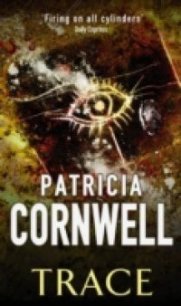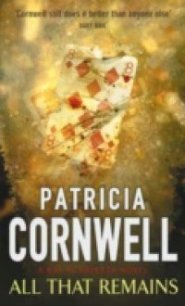The Last Precinct - Cornwell Patricia (читаем книги онлайн TXT) 📗
Chapter 9
I SPEND THE NEXT FEW HOURS AT MY DESK, DICTAT-ing the autopsy report of John Doe and returning phone calls and initialing paperwork, and leave the office late afternoon, heading west.
Sunlight filters through broken clouds and gusts of wind send brown leaves fluttering to the earth like lazy birds. It has stopped snowing and the temperature is rising, the world dripping and sizzling with the wet sounds of traffic.
I drive Anna's silver Lincoln Navigator toward Three Chopt Road while news on the radio endlessly goes on about Jean-Baptiste Chandonne's transport out of the city. There is much made over his bandaged eyes and chemical burns. The story of my maiming him to save my life has taken on an energy. Reporters have found their angle. Justice is blind. Dr. Scarpetta has rendered the classic corporeal punishment. "Blinding somebody, hey take that," a host says on the air. "Who was the guy in Shakespeare? Remember, they gouged his eyes out? King Lear? You see that movie? The old king had to put raw eggs in his eye sockets or something so it wouldn't hurt so much. Really gross."
The sidewalk leading to St. Bridget's brown double front doors is slushy with salt and melted snow, and there are at most twenty cars in the parking lot. It is as Marino predicted: The police are not out in force, nor is the press. The weather may be what has kept the crowds away from the old Gothic brick church, or more likely it is the deceased herself. I, for one, am not here out of respect or affection or even a sense of loss. I unbutton my coat and step inside the narthex as I try to evade the uncomfortable truth: I could not stand Diane Bray and have come here only out of duty. She was a police official. I was acquainted with her. She was my patient.
There is a large photograph of her on a table, just inside the narthex, and I am startled to see her haughty self-absorbed beauty, the icy cruel glint in her eyes that no camera could disguise, no matter the angle, the lighting or skills of the photographer. Diane Bray hated me for reasons I still fail to completely grasp. By all accounts, she was obsessed with me and my power and focused on my every dimension in ways I never have. I suppose I do not see myself the way she did, and I was slow to catch on when she began her aggressions, her unbelievably intense war against me which culminated in her aspiring to be appointed to a cabinet position in the commonwealth.
Bray had it all figured out. She would help mastermind transferring the medical examiner's division from the health department to public safety so she could then, if all went according to plan, somehow maneuver the governor into appointing her secretary of public safety. That done, I would politically answer to her, and she could even have the pleasure of firing me. Why? I continue to search for reasonable motivations and fail to find any that completely satisfy me. I had never even heard of her before she signed on with the Richmond P.D. last year. But she certainly knew about me and moved to my fair city with plots and schemes in the works to undo me sadistically, slowly, through a series of shocking disruptions, slanders and professional obstructions and humiliations before she ultimately ruined my career, my life. I suppose in her fantasies, the climax to her cold-blooded machinations would have been for me to give up my position in disgrace, commit suicide and leave a note saying it was her fault. Instead, I am still here. She is not. That I should have been the one who tended to her brutalized remains is an irony beyond description.
A cluster of police officers in dress uniform are talking to each other, and near the sanctuary door, Chief Rodney Harris is with Father O'Connor. There are civilians, too, people in fine clothes who don't look familiar, and I sense from the lost, vacant way they are casting about that they aren't local. I pick up a service bulletin and wait to speak to Chief Harris and my priest. "Yes, yes, I understand," Father O'Connor is saying. He is serene in a long, creamy robe, his fingers laced at his waist. I realize with a twinge of guilt that I have not seen him since Easter.
"Well, Father, I just can't. That's the part I can't accept," Harris replies, his thinning red hair plastered back from his flabby, unattractive face. He is a short man with a soft body that is genetically coded to be fat, a Pillsbury Dough Boy in dress blues. Harris is not a nice man and he resents powerful women. I have never understood why he hired Diane Bray and can only assume it wasn't for the right reasons.
"God's will is not always for us to understand," says Father O'Connor, and then he sees me. "Dr. Scarpetta." He smiles and takes my hand in both of his. "So good of you to come. You've been in my thoughts and prayers." The pressure of his fingers and the light in his eyes convey that he understands what has happened to me and cares. "How's your arm? I wish you would come by to see me sometime."
"Thank you, Father." I offer my hand to Chief Harris. "I know this is a difficult time for your department," I tell him. "And for you personally."
"Very, very sad," he says, staring off at other people as he gives me a perfunctory, brusque handshake.
The last time I saw Harris was at Bray's house when he walked in and was confronted by the appalling sight of her body. That moment will forever lodge between him and me. He should never have come to the scene. There was no good reason for him to see his deputy chief so completely degraded, and I will always resent him for it. I have a special distaste for people who treat crime scenes callously and with disrespect, and Harris's showing up at Bray's scene was a power play and an indulgence in voyeurism, and he knows I know it. I move on into the sanctuary and feel his eyes on my back. "Amazing Grace" swells from the organ, and people are finding pews midway up the aisle. Saints and crucifixion scenes glow in rich stained glass, and marble and brass crosses gleam. I sit on the aisle, and moments later the processional begins, and the smartly dressed strangers I noticed earlier walk in with the priest. A young crucifer carries the cross, while a man in a black suit bears the gold-and-red enamel urn containing Diane Bray's cremated remains. An elderly couple holds hands, dabbing tears.
Father O'Connor greets all of us and I learn that Bray's parents and two brothers are here. They have come from upstate New York, Delaware and Washington, D.C., and loved Diane very much. The service is simple. It isn't long. Father O'Connor sprinkles the waters of baptism on the urn. No one but Chief Harris offers any reflections or eulogies, and what he has to say is stilted and generic. "She gladly enlisted in a profession that is all about rendering help to others." He stands stiffly behind the pulpit and reads from his notes. "Knowing every day that she was placing herself at risk, for that is the life of the police. We learn to stare death in the face and fear not. We know what it is to be alone and even to be hated, and yet we fear not. We know what it is to be a lightning rod for evil, for those who are on this planet to take from others."
Wood creaks as people shift in their pews. Father O'Connor smiles kindly, his head tilted at an angle as he listens. I tune out Harris. I have never attended such a sterile, hollow service and I shrink inside with dismay. The liturgy, the gospel acclamations, the singing and prayers carry no music or passion, because Diane Bray did not love anyone, including herself. Her rapacious, overreaching life has scarcely left
a ripple, All of us leave silently, venturing out into the raw,
dark night to find our cars and escape. I walk briskly with head bent, the way I do when I wish to avoid others. I am aware of sounds, of a presence, and I turn around as I unlock my car door. Someone has stepped up behind me.



